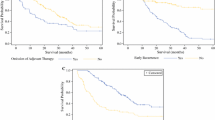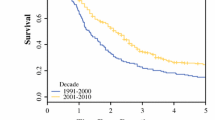Abstract
Background
Improved safety of pancreatic surgery has led to consideration of more aggressive approaches, such as resection for primary pancreatic ductal adenocarcinoma (PDAC) with metastatic disease (M1).
Methods
A total of 29 patients who underwent pancreatic resection with resection of associated metastatic disease (interaortocaval lymph node dissection, liver resection, and/or multiorgan resections) were retrospectively identified from a database of 316 R0/R1 pancreatic resections for PDAC. An explorative data analysis of perioperative and clinicopathological parameters, and overall survival was performed by Kaplan-Meier estimation, log rank test, and Fisher’s exact test.
Results
The overall in-hospital mortality and morbidity of R0/R1 pancreatic resections for M1 disease (n = 29) was 0% and 24.1%, compared with 4.2% and 35.2% of R0/R1 pancreatic resections for M0 disease (n = 287). The median overall survival time was 13.8 months (95% confidence interval [CI], 11.4–20.5), and the estimated 1-year overall survival rate was 58.9% (95% CI, 34.8–76.7) for patients with M1 disease. The median survival in those with metastatic interaortocaval lymph nodes was 27 months (95% CI, 9.6–27.0), whereas it was 11.4 months (95% CI, 7.8–16.5) and 12.9 months (95% CI, 7.2–20.5) for those with liver and peritoneal metastases, respectively.
Conclusions
Pancreatic resections with M1 disease can be performed with acceptable safety in highly selected patients. The survival after interaortocaval lymph node resection is comparable to that of other lymph nodes that do not constitute M1 disease. Resection of liver and peritoneal metastases, although safe in this series, cannot be generally recommended until further controlled trials can be conducted.




Similar content being viewed by others
References
Jemal A, Siegel R, Ward E, et al. Cancer statistics, 2006. CA Cancer J Clin 2006; 56:106–30
Parkin DM, Bray FI, Devesa SS. Cancer burden in the year 2000. The global picture. Eur J Cancer 2001; 37(Suppl 8):S4–66
Parkin DM, Bray F, Ferlay J, Pisani P. Estimating the world cancer burden: Globocan 2000. Int J Cancer 2001; 94:153–6
Ozawa F, Friess H, Kunzli B, et al. Treatment of pancreatic cancer: the role of surgery. Dig Dis 2001; 19:47–56
Fernandez-del CC, Rattner DW, Warshaw AL. Standards for pancreatic resection in the 1990s. Arch Surg 1995; 130:295–9
Stojadinovic A, Hoos A, Brennan MF, Conlon KC. Randomized clinical trials in pancreatic cancer. Surg Oncol Clin N Am 2002; 11:207–29
Cameron JL, Pitt HA, Yeo CJ, Lillemoe KD, Kaufman HS, Coleman J. One hundred and forty-five consecutive pancreaticoduodenectomies without mortality. Ann Surg 1993; 217:430–5
Trede M, Schwall G, Saeger HD. Survival after pancreatoduodenectomy. 118 consecutive resections without an operative mortality. Ann Surg 1990; 211:447–58
Howard JM. Development and progress in resective surgery for pancreatic cancer. World J Surg 1999; 23:901–6
Picozzi VJ, Kozarek RA, Traverso LW. Interferon-based adjuvant chemoradiation therapy after pancreaticoduodenectomy for pancreatic adenocarcinoma. Am J Surg 2003; 185:476–80
Fortner JG. Regional pancreatectomy for cancer of the pancreas, ampulla, and other related sites. Tumor staging and results. Ann Surg 1984; 199:418–25
Fortner JG. “Radical” abdominal cancer surgery: current state and future course. Jpn J Surg 1989; 19:503–9
Shoup M, Conlon KC, Klimstra D, Brennan MF. Is extended resection for adenocarcinoma of the body or tail of the pancreas justified? J Gastrointest Surg 2003; 7:946–52
Yeo CJ, Cameron JL, Sohn TA, et al. Pancreaticoduodenectomy with or without extended retroperitoneal lymphadenectomy for periampullary adenocarcinoma: comparison of morbidity and mortality and short-term outcome. Ann Surg 1999; 229:613–22
Capussotti L, Massucco P, Ribero D, Vigano L, Muratore A, Calgaro M. Extended lymphadenectomy and vein resection for pancreatic head cancer: outcomes and implications for therapy. Arch Surg 2003; 138:1316–22
Nguyen TC, Sohn TA, Cameron JL, et al. Standard vs. radical pancreaticoduodenectomy for periampullary adenocarcinoma: a prospective, randomized trial evaluating quality of life in pancreaticoduodenectomy survivors. J Gastrointest Surg 2003; 7:1–9
Pedrazzoli S, DiCarlo V, Dionigi R, et al. Standard versus extended lymphadenectomy associated with pancreatoduodenectomy in the surgical treatment of adenocarcinoma of the head of the pancreas: a multicenter, prospective, randomized study. Lymphadenectomy Study Group. Ann Surg 1998; 228:508–17
Yeo CJ, Cameron JL, Lillemoe KD, et al. Pancreaticoduodenectomy with or without distal gastrectomy and extended retroperitoneal lymphadenectomy for periampullary adenocarcinoma, part 2: randomized controlled trial evaluating survival, morbidity, and mortality. Ann Surg 2002; 236:355–66
Van CE, Aerts R, Haustermans K, Topal B, Van SW, Verslype C. Systemic treatment of pancreatic cancer. Eur J Gastroenterol Hepatol 2004; 16:265–74
Smeenk HG, Tran TC, Erdmann J, van Eijck CH, Jeekel J. Survival after surgical management of pancreatic adenocarcinoma: does curative and radical surgery truly exist? Langenbecks Arch Surg 2005; 390:94–103
Wagner M, Redaelli C, Lietz M, Seiler CA, Friess H, Buchler MW. Curative resection is the single most important factor determining outcome in patients with pancreatic adenocarcinoma. Br J Surg 2004; 91:586–94
Yeo CJ, Cameron JL, Lillemoe KD, et al. Pancreaticoduodenectomy for cancer of the head of the pancreas: 201 patients. Ann Surg 1995; 221:721–31
Neoptolemos JP, Stocken DD, Dunn JA, et al. Influence of resection margins on survival for patients with pancreatic cancer treated by adjuvant chemoradiation and/or chemotherapy in the ESPAC-1 randomized controlled trial. Ann Surg 2001; 234:758–68
Neoptolemos JP, Stocken DD, Friess H, et al. A randomized trial of chemoradiotherapy and chemotherapy after resection of pancreatic cancer. N Engl J Med 2004; 350:1200–10
Richter A, Niedergethmann M, Sturm JW, Lorenz D, Post S, Trede M. Long-term results of partial pancreaticoduodenectomy for ductal adenocarcinoma of the pancreatic head: 25-year experience. World J Surg 2003; 27:324–9
Bassi C, Stocken DD, Olah A, et al. Influence of surgical resection and post-operative complications on survival following adjuvant treatment for pancreatic cancer in the ESPAC-1 Randomized Controlled Trial. Dig Surg 2005; 22:353–63
Goldstein D, Carroll S, Apte M, Keogh G. Modern management of pancreatic carcinoma. Intern Med J 2004; 34:475–81
Koeppler H, Duru M, Grundheber M, et al. Palliative treatment of advanced pancreatic carcinoma in community-based oncology group practices. J Support Oncol 2004; 2:159–63
Prost P, Ychou M, Azria D. [Gemcitabine and pancreatic cancer]. Bull Cancer 2002; 89(Spec No):S91–5
Cunningham D, Chau I, Stocken D, et al. Phase III randomised comparison of gemcitabine (GEM) versus gemcitabine plus capecitabine (GEM-CAP) in patients with advanced pancreatic cancer. Eur J Cancer 2005; 3:4 (abstract PS11)
Moore MJ, Goldstein D, Hamm J, et al. Erlotinib improves survival when added to gemcitabine in patients with advanced pancreatic cancer. A phase III trial of the National Cancer Institute of Canada Clinical Trials Group (NCIC-CTG). J Clin Oncol 2005;ASCO Annual Meeting Proceedings. (abstract 77). Vol 23, No.16S, Part I of II (June 1 Supplement), 2005:1 41st Annual Meeting American Society of Clinical Oncology (ASCO) May 13–17, 2005 Orlando, Florida
Yamada H, Katoh H, Kondo S, Okushiba S, Morikawa T. Hepatectomy for metastases from non-colorectal and non-neuroendocrine tumor. Anticancer Res 2001; 21:4159–62
Christophe M, Le Treut YP, Pol B, Brandone JM, Capobianco C, Bricot R. [Cancer of the pancreas. A plea for resection. 162 operated patients]. Presse Med 1992; 21:741–4
Lillemoe KD, Cameron JL, Yeo CJ, et al. Pancreaticoduodenectomy. Does it have a role in the palliation of pancreatic cancer? Ann Surg 1996; 223:718–25
Beger HG, Thorab FC, Liu Z, Harada N, Rau BM. Pathogenesis and treatment of neoplastic diseases of the papilla of Vater: Kausch-Whipple procedure with lymph node dissection in cancer of the papilla of Vater. J Hepatobiliary Pancreat Surg 2004; 11:232–8
Pedrazzoli S, Pasquali C, Sperti C. General aspects of surgical treatment of pancreatic cancer. Dig Surg 1999; 16:265–75
Shimada K, Kosuge T, Yamamoto J, Yamasaki S, Sakamoto M. Successful outcome after resection of pancreatic cancer with a solitary hepatic metastasis. Hepatogastroenterology 2004; 51:603–5
Sunada S, Miyata M, Tanaka Y, et al. Aggressive resection for advanced pancreatic carcinoma. Surg Today 1992; 22:74–7
Burris HA III, Moore MJ, Andersen J, et al. Improvements in survival and clinical benefit with gemcitabine as first-line therapy for patients with advanced pancreas cancer: a randomized trial. J Clin Oncol 1997; 15:2403–13
Conroy T, Paillot B, Francois E, et al. Irinotecan plus oxaliplatin and leucovorin-modulated fluorouracil in advanced pancreatic cancer—a Groupe Tumeurs Digestives of the Federation Nationale des Centres de Lutte Contre le Cancer study. J Clin Oncol 2005; 23:1228–36
Van Cutsem E, van de Velde H, Karasek P, et al. Phase III trial of gemcitabine plus tipifarnib compared with gemcitabine plus placebo in advanced pancreatic cancer. J Clin Oncol 2004; 22:1430–8
Cress RD, Yin D, Clarke L, Bold R, Holly EA. Survival among patients with adenocarcinoma of the pancreas: a population-based study (United States). Cancer Causes Control 2006; 17:403–9
Carpelan-Holmstrom M, Nordling S, Pukkala E, et al. Does anyone survive pancreatic ductal adenocarcinoma? A nationwide study re-evaluating the data of the Finnish Cancer Registry. Gut 2005; 54:385–7
Connor S, Bosonnet L, Ghaneh P, et al. Survival of patients with periampullary carcinoma is predicted by lymph node 8a but not by lymph node 16b1 status. Br J Surg 2004; 91:1592–9
Farnell MB, Pearson RK, Sarr MG, et al. A prospective randomized trial comparing standard pancreatoduodenectomy with pancreatoduodenectomy with extended lymphadenectomy in resectable pancreatic head adenocarcinoma. Surgery 2005; 138:618–28
Henne-Bruns D, Vogel I, Luttges J, Kloppel G, Kremer B. Ductal adenocarcinoma of the pancreas head: survival after regional versus extended lymphadenectomy. Hepatogastroenterology 1998; 45:855–66
Nimura Y, Nagino M, Kato H, et al. Standard versus extended lymphadenectomy for pancreatic cancer: a multicenter, randomized controlled trial. Pancreatology 2004; 4:274
Klempnauer J, Ridder GJ, Piso P, Pichlmayr R. [Is liver resection in metastases of exocrine pancreatic carcinoma justified?]. Chirurg 1996; 67:366–70
Louvet C, Labianca R, Hammel P, et al. Gemcitabine in combination with oxaliplatin compared with gemcitabine alone in locally advanced or metastatic pancreatic cancer: results of a GERCOR and GISCAD phase III trial. J Clin Oncol 2005; 23:3509–16
Ueno H, Okusaka T, Ikeda M, Takezako Y, Morizane C. An early phase II study of S-1 in patients with metastatic pancreatic cancer. Oncology 2005; 68:171–8
Author information
Authors and Affiliations
Corresponding author
Additional information
S.V.S. and J.K. contributed equally to this article.
Rights and permissions
About this article
Cite this article
Shrikhande, S.V., Kleeff, J., Reiser, C. et al. Pancreatic Resection for M1 Pancreatic Ductal Adenocarcinoma. Ann Surg Oncol 14, 118–127 (2007). https://doi.org/10.1245/s10434-006-9131-8
Received:
Accepted:
Published:
Issue Date:
DOI: https://doi.org/10.1245/s10434-006-9131-8




